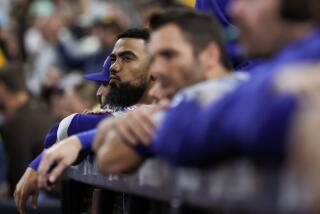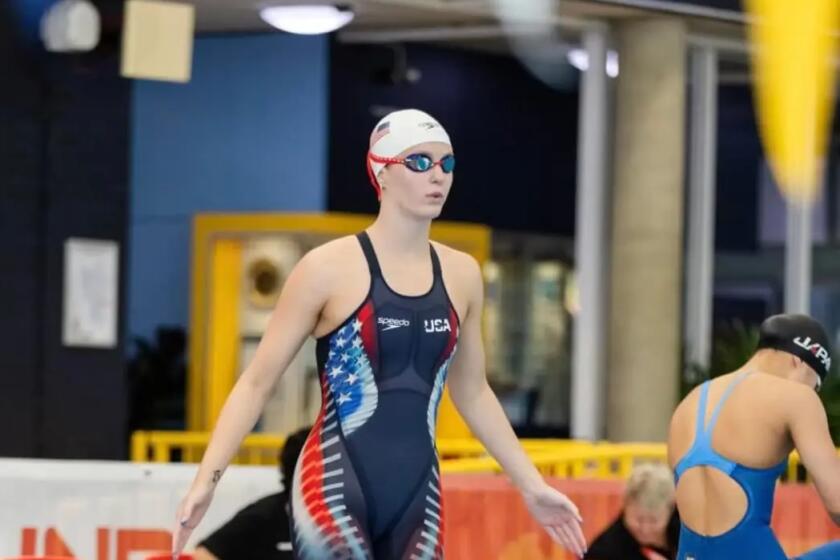Red Sox Can’t Block A’s Way to a 3-0 Lead
- Share via
OAKLAND — On a day when pine tar, ejections and possible suspensions were all the rage on the East Coast, the Oakland Athletics and the Boston Red Sox drummed up a controversy all their own Saturday night in Game 3 of the American League championship series.
Now, it was no match for l’affaire Howell, but it was about the best the American League could do on short notice. And considering how this series is going, with the A’s perched on the brink of a sweep after their 10-6 victory, it may have been the only way possible to keep the Red Sox interested. The scene was set in the top of the fifth inning, with Oakland holding a tenuous 6-5 lead and Boston having the tying run at third base in the person of Dwight Evans. Boston also had Rich Gedman at first base--and there’s where the trouble began.
Jody Reed hit a one-out grounder to Oakland third baseman Carney Lansford, who fired to second baseman Mike Gallego in hopes of turning an around-the-horn double play. Gallego made his pivot, and his throw, when Gedman, a 215-pound catcher, slid past second base and barreled into Gallego.
Over at first base, Reed was easily beating Gallego’s throw to Mark McGwire. But back at second, umpire Ken Kaiser was signaling two outs--waving Gedman out for interference, calling for an automatic double play and wiping the tying run Evans would have scored off the board.
The Red Sox bench went berserk. Bruce Hurst, today’s scheduled starter in Game 4, argued his way into an ejection. Boston Manager Joe Morgan carried on, too, but saved his harshest words for his postgame press conference, when he called for Kaiser’s suspension.
“Let me tell you about Mr. Kaiser,” Morgan said without prompting. “He’s been doing this for years, making these kinds of cheap calls. Year after year, and something should be done about.
“I think he should get thrown out of the series. There was that cheap balk he called the other night against (Roger) Clemens, and that call tonight was ridiculous.
“Now, then, what was your question?”
Morgan maintained that interference could not be called because Gallego released the ball before Gedman made contact.
“(Kaiser) said he elbowed (Gallego) in the chest,” Morgan said. “The ball was halfway to first when contact was made if you look at the replay.”
That was true, but Marty Springstead, AL supervisor of umpires, contended the throw was not part of the issue.
“The rule simply is there to keep the infielder from getting hurt,” Springstead said. “You cannot throw a rollblock at an infielder. It doesn’t have anything to do with (interfering with the throw). . . . It had no bearing on the play at first. The rule is there to protect the infielder.”
Springstead was summoned to the podium as part of the American League’s attempt at damage control. League officials thought it best to shield Kaiser from the press, so they kept him out of the interview room and had Springstead pinch-hit instead.
Springstead quoted from Rule 3:16:
“Any runner who, in the opinion of the umpire, contacts or makes contact with a fielder with a slide or rollblock that is not a bonafide effort to stay on the base then shall be called out for interference and an appropriate double play shall be called.”
The double play was indeed called, ending the top of the inning. But the Red Sox would hardly consider it appropriate.
“Any time you take a run away, it hurts you,” Gedman said. “ . . . My head was ringing when I heard Kaiser’s call. I didn’t believe it.”
While Gedman spoke with reporters outside the Red Sox clubhouse, ABC broadcaster Reggie Jackson sauntered by and told Gedman, “Good, tough, aggressive slide.”
Gedman agreed.
“I was doing what I thought was my job,” Gedman said. “I went in to try to break up the double play. I went straight through the bag, not out of the path one way or the other. What else can I do.
“Did I throw an elbow? Was it a rollblock? You tell me. You’re coming up after your slide and your hands come up naturally. That’s how I hit him.”
Tony La Russa, the Oakland manager, took great pains to downplay the incident.
“I wouldn’t make that much of it,” La Russa said. “We play a whole 9 innings and a lot of things happen in an entire game. Would one run have made that much difference? How about the other 8 innings?”
La Russa had a point. Besides that play, there were 10 Oakland runs, including 4 Oakland home runs, and 7 innings of exceptional relief by the A’s bullpen. The final score had Oakland beating Boston by 4 runs.
But the Red Sox, down, 0-3, in the series and facing their last gasp today, maintained that momentum swung as soon as Kaiser waved his fist.
In reality, though, it swung much earlier than that. Boston’s retooled lineup did a hammer job on Oakland starter Bob Welch, scoring 5 runs before knocking Welch out of the game with 2 out in the second inning. Ellis Burks, replacing Wade Boggs atop the batting order, led off with a single to start a 3-run first inning and doubled in the second inning before scoring ahead of Mike Greenwell’s 2-run home run.
Just like that, Boston led, 5-0.
And just like that, the Red Sox gave it all away. By the bottom of the third, Oakland lead, 6-5.
Limited to just a pair of Jose Canseco home runs in the first two games at Fenway Park, the A’s finally unloaded their heavy arsenal. In a 4-run second inning, Mark McGwire hit a solo home run and Lansford connected on a 2-run home run. A 2-run home run by Ron Hassey made it 6-5 in the third and a final 2-run shot by Dave Henderson in the eighth salted the victory away.
“I hope nobody got hurt in the seats out there,” Morgan deadpanned.
The A’s are accustomed to such shellings--they were second in the American League with 156 home runs in 1988--but even they had to marvel at Saturday’s rapid-fire assault.
“The ball carried the best I’ve seen it carry all year,” McGwire said.
Added Canseco: “I was freaking out. I couldn’t believe the way the ball was carrying.”
Red Sox pitching might have had something to do with it. Starter Mike Boddicker surrendered the first 3 homers--in less than 3 innings’ time. Bob Stanley served up No. 4 to Henderson--on his fourth pitch after leaving the bullpen.
In the meantime, the Oakland bullpen was doing a pretty fair job of cleaning up for Welch. Gene Nelson earned his second victory of the playoffs with 3 innings of 4-hit relief. He was followed, in order, by Curt Young (1 innings, 1 unearned run), Eric Plunk ( inning), Rick Honeycutt ( inning) and, one more time, by Dennis Eckersley (2 innings, no hits).
Eckersley has appeared in all 3 games of this series. More than that, he saved all 3.
“It’s fun when the game’s over,” Eckersley said of his share of the record, “but getting prepared each day has me completely stressed out.”
The Red Sox know the feeling. They have played 3 games against the Oakland A’s and lost them all. They lost with Hurst in Fenway Park. They lost with Clemens. They lost in Oakland after building a 5-0 advantage.
For Boston, nothing seems to work here. The Red Sox are 0-7 at the Coliseum in 1988, 1-15 in their last 16 games in Oakland.
They can’t afford another.
And by the by: The Coliseum crowd did come up with an answer to the Fenway fans’ mocking “STER-OIDS, STER-OIDS” chant they devised for Canseco. It began in the bottom of the seventh inning Saturday and grew in volume in the eighth and the ninth:
“SWEEP, SWEEP.”
Oakland fans are hoping to have the final word in this one today.
More to Read
Go beyond the scoreboard
Get the latest on L.A.'s teams in the daily Sports Report newsletter.
You may occasionally receive promotional content from the Los Angeles Times.










